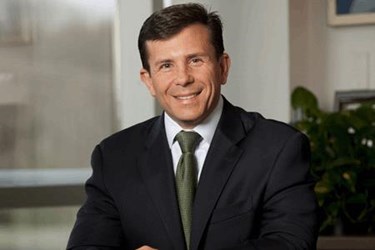John Crowley — A Biopharma Bright Spot

By Rob Wright, Chief Editor, Life Science Leader
Follow Me On Twitter @RfwrightLSL

While watching President Trump address Congress on February, 28, 2017, I was struck by an odd sensation. Let me explain. The President was talking about the day being Rare-Disease Day, and that there was a special guest in attendance, Megan Crowley. When the television cameras panned up to show the 20-year old Notre Dame student who suffers from Pompe disease, I noticed a smiling gentleman standing next to Megan, and I thought, “I know that guy! How do I know that guy?” I considered it an odd sensation because while people often recognize someone on TV, it is rare (at least for me anyway) to feel a personal connection to the person that is smiling back at you. The President went on to explain how Megan’s father, John, had started a company to save his daughter’s life, and suddenly it clicked — that smiling face was none other than John Crowley, the founder and CEO of Amicus Therapeutics. A past contributor to Life Science Leader’s CEO Corner column, he and his daughter, Megan, are (in my opinion) two American heroes who represent the best of what the biopharmaceutical industry has to offer.
John Crowley — More Than An American Entrepreneurial Success Story
In case you haven’t heard the story about John Crowley’s journey, let me quickly get you up to speed. Nineteen years ago, he was informed that his then one-year-old daughter (Megan) had a rare and rapidly fatal disease. At the time there were no available treatments. A few months later he and his wife were hit with some additional bad news (i.e., their new baby, Patrick, had the same genetic disease and would soon begin experiencing a progressive weakening of his muscles). Frustrated by the slow pace of drug development, Crowley opted to take matters into his own hands. Quitting his job as an executive at Bristol-Myers Squibb, he took over as the CEO of a small biotech with a promising approach to treating Pompe disease.
But the desperate dad would soon learn that investors had very little interest in backing an inexperienced executive (i.e., Crowley) along with the scientist (i.e., William Canfield) whose work was serving as the premise for the startup known as Novazyme Pharmaceuticals. And while their work eventually led to the successful approval of the drug Myozyme (i.e., Lumizyme in the U.S.), it is important not to gloss over the challenges faced along the way. For example, meetings between scientific outsiders and Canfield often became heated as the scientist attempted to explain things such as how he intended to manufacture the product. Crowley had to take out a $100,000 second mortgage on his home just to get the company through a tough financial period. Fraught with skepticism and doubt, Crowley and Canfield endured, persevered, and eventually overcame. In fact, Crowley’s story was so rousing that not only did it inspire a Wall Street Journal reporter (i.e., Geeta Anand) to write a book (i.e., The Cure: How a Father Raised $100 Million -- and Bucked the Medical Establishment -- in a Quest to Save His Children), but it also served as the inspiration for the 2010 movie — Extraordinary Measures. Further, this busy executive even found the time to pen his own book, Chasing Miracles: The Crowley Family Journey of Strength, Hope, and Joy. And if this is not enough to convince you that John Crowley is a biopharma bright spot, you should also note that he is a former commissioned officer in the U.S. Navy Reserve, and a former combat veteran of the global war on terrorism.
We Need A Few More John Crowley’s In Our Industry
After all of the negative press we have seen over the past few years surrounding drug pricing (e.g., Mylan’s EpiPen) and a variety of industry bad actors (e.g., Martin Shkreli) that have further tarnished biopharma’s once sterling image, it is refreshing to have a bona fide American hero represent our industry. Following Crowley’s acknowledgement by the President, I sent him a short email expressing pride and thanks. And while I can only imagine how full his email in box must have been following this most recent recognition, like a true leader, not only did he respond within just a few days, but he even took a moment to share some positive feedback on an article he had recently read in Life Science Leader.
I believe our industry is filled with many more people just like John Crowley, and think it is about time we start highlighting more of these entrepreneurial success stories. But to do so I need your help. If you know someone who has made a significant difference in the lives of patients, but perhaps hasn’t gotten the recognition they (and our industry) deserve, drop me an email (rob.wright@lifescienceconnect.com) with some of the details. Perhaps together we can start bringing to light some of the many people who can serve as additional biopharma bright spots. Because I for one have grown weary of the constant negativity surrounding an industry that has done so much for so many.
